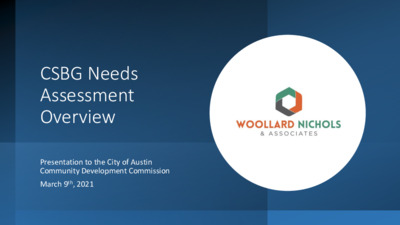Item2b_CSBG Needs Assessment Overview 030921 — original pdf
Backup

CSBG Needs Assessment Overview Presentation to the City of Austin Community Development Commission March 9th, 2021 Overview 1. Another Needs Assessment?! (Background & Justification) 2. Proposed Needs Assessment Plan 3. Discussion Background & Justification • Austin Public Health is identified as the Travis County Community Action Agency (CAA) receiving Community Services Block Grant Funds (CSBG) – federal funds passed through the Texas Department of Housing & Community Affairs (TDHCA) • Federal regulations require CAA’s to conduct needs assessments and use the results to design programs to meet community needs. • The Community Development Commission is the designated CSBG community board and must approve the needs assessment plan and accept the final completed assessment Where are CSBG Services Currently Offered? Currently, there are 6 Neighborhood Centers utilizing CSBG funding to support case management and public health services. In addition, CSBG services are provided at Turner- Roberts Recreation Center (Colony Park), Dove Springs and Gilbert Elementary TDHCA Community Needs Assessment Standards • Conduct every 3 years • Collects current poverty data and its prevalence related to gender, age, and race/ethnicity • Collects and analyzes both qualitative and quantitative data on its service areas • Includes key findings on the causes and conditions of poverty and the needs • Governing board formally accepts the completed assessment • Informs an outcome-based and anti- poverty focused Community Action Plan • Customer satisfaction data and input identified is considered in the strategic planning process Proposed Needs Assessment Plan 1. Work Plan Development Collect Quantitative Data • Community Assessment Tool • Census/ACS data • Other community data (e.g. 211) Collect Qualitative Data • Key informant interviews (CDC members) • Polls during responsible organization meetings (residents) • Electronic survey (Neighborhood Center clients) • Service provider survey/interviews Analyze Data • Include key findings on the causes and conditions of poverty and the needs • Requirement to rank top 5 community needs Develop Report • Report due to TDHCA by June 1, 2021 2. 3. 4. 5. Discussion • 10-15 minute interactive polling sessions at responsible organization virtual meetings in March and April to engage resident perspectives. Can CDC members assist? • Pros and cons of surveying versus interviewing service providers right now? • Other questions or considerations?